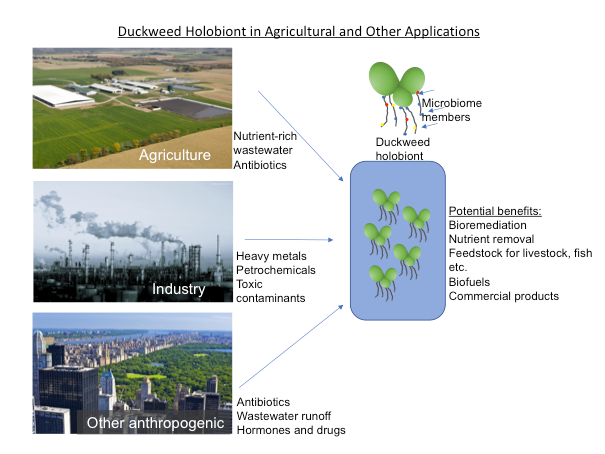Duckweeds, small aquatic plants that grow on the surface of still waters, are commonly observed in lakes and ponds, including those in Prospect Park, Central Park, and other NYC parks. With 37 species and five genera, duckweeds are found on every continent except Antarctica and native to every state in the United States. Duckweeds have innovative applications that include their use in phytoremediation of polluted waters and a source for biofuel production. Plant microbiomes affect plant growth and health, nutrient utilization, and plants’ responses to chemical, environmental, and biological stressors and pollutants. Advances in genomic sequencing and metabolomics analysis allow us to systematically study the interactions between plants, exudates, and microbiomes, and to fill gaps in our understanding of how microbiomes beneficially and antagonistically interact with plants, such as duckweeds, as they take up nutrients and respond to chemical pollutants.
Duckweeds present an excellent system to study microbiomes and the molecular interactions that shape the composition and metabolic potential of the plant and its microbiome. The goals of our research are to develop duckweeds colonized with microbiomes optimized for site-specific remediation of urban pollutants, and to manipulate microbiomes to alter the metabolic activity of host duckweeds in order to improve the composition of their biomass for as a stock for food or biofuel. The modified duckweed-microbiomes represent a novel and significant resource that has not been available previously, and it will lead to greater flexibility and specificity in remediating sites that pose a risk to urban residents and natural resources. As duckweed is globally distributed and can grow quickly in mild to extreme climates, duckweed also has great potential for intensive agricultural production to fulfill the food and fuel needs of a growing population. Our proposed research targets the goals of 1) responding to climate and energy needs, 2) sustainable intensification of urbanization, and 3) sustainable use of natural resources.
Students working on this BUEE project will spend time in the field collecting duckweeds from lakes and ponds around NYC and will work in the lab to determine if duckweed species type and location influence the duckweed microbiome. The data collected on this project will be important in determining if duckweed microbiomes can be modified to promote nutrient removal and phytoremediation of contaminants from the waters of NYC, and if changes in microbiome diversity allow duckweeds to adapt quickly to a changing climate and increasingly stressful environments associated with cities.
